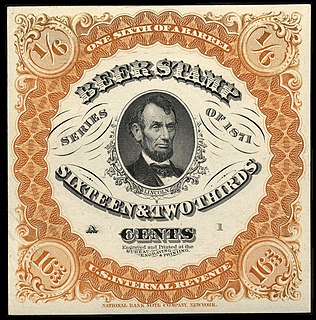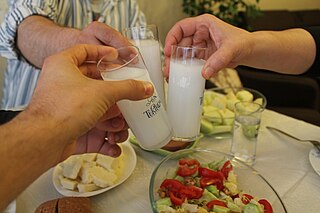
The Alcohol and Tobacco Tax and Trade Bureau, statutorily named the Tax and Trade Bureau and frequently shortened to TTB, is a bureau of the United States Department of the Treasury, which regulates and collects taxes on trade and imports of alcohol, tobacco, and firearms within the United States.

The Oregon Liquor and Cannabis Commission (OLCC) is a government agency of the U.S. state of Oregon. The OLCC was created by an act of the Oregon Legislative Assembly in 1933, days after the repeal of prohibition, as a means of providing control over the distribution, sales and consumption of alcoholic beverages. To this end, the agency was given the authority to regulate and license those who manufacture, sell or serve alcohol. Oregon is one of 18 alcoholic beverage control states that directly control the sales of alcoholic beverages in the United States. In 2014, the passage of Oregon Ballot Measure 91 (2014) legalized the recreational use of marijuana in Oregon and gave regulatory authority to the OLCC.
The Iowa Alcoholic Beverages Division is the alcoholic beverage control authority for the U.S. state of Iowa. Since March 8, 1934, it has regulated the traffic in, and maintained a monopoly on the wholesaling of, alcoholic beverages in the state, thus making Iowa an alcoholic beverage control state.

The New Hampshire Liquor Commission regulates the sale of alcoholic beverages in the U.S. state of New Hampshire, one of eighteen alcoholic beverage control states.
The Washington State Liquor and Cannabis Board, formerly the Washington State Liquor Control Board, is an administrative agency of the State of Washington. The Liquor and Cannabis Board is part of the executive branch and reports to the Governor. The board's primary function is the licensing of on and off premises establishments which sell any type of alcohol, and the enforcement and education of the state's alcohol, tobacco, and cannabis laws.
The State Board of Equalization (BOE) is a public agency charged with tax administration and fee collection in the state of California in the United States. The authorities of the Board fall into four broad areas: sales and use taxes, property taxes, special taxes, and acting as an appellate body for franchise and income tax appeals. The BOE is the only publicly elected tax commission in the United States. The board is made up of four directly elected members, each representing a district for four-year terms, along with the State Controller, who is elected on a statewide basis, serving as the fifth member. In June 2017, Governor Jerry Brown signed legislation stripping the Board of many of its powers, returning the agency to its original core responsibilities.

The Delaware Division of Alcohol and Tobacco Enforcement (DATE) is a law enforcement agency of the State of Delaware and is a division of the Delaware Department of Safety and Homeland Security (DSHS).

An excise or excise tax is any duty on manufactured goods which is levied at the moment of manufacture, rather than at sale. Excises are often associated with customs duties ; customs are levied on goods which come into existence – as taxable items – at the border, while excise is levied on goods which came into existence inland.
The Virginia Alcoholic Beverage Control Authority is one of the eleven public safety agencies under the Secretariat of Public Safety and Homeland Security for the Commonwealth. The agency administers the state's ABC laws with an emphasis on public service and a focus on protecting citizens by ensuring a safe, orderly and regulated system for convenient distribution and responsible consumption of alcohol.
The Alcohol and Tobacco Division is a division of the Georgia Department of Revenue, in the United States. It ensures that the State collects all taxes and fees, administered by the Department, which are owed by individuals and businesses subject to Georgia's alcoholic beverage, tobacco and coin-operated amusement machine laws and regulations. It provides assistance to taxpayers, license and permit applicants and businesses in the areas of alcohol, tobacco, and coin-operated amusement machines.
The Liquor Control Commission is an Illinois state government commission, with four divisions.
The Division of Alcoholic Beverage Control is a Kansas state government agency responsible for enforcing the alcohol laws of Kansas. It issues state licenses and permits, monitors the flow of restricted products, inspects licensed premises and enforces restrictions on underage purchasing and drinking of alcohol. ABC Agents are state certified Law Enforcement agents, therefore being armed and possessing powers of arrest. While primarily focusing on the enforcement of the Kansas laws regarding liquor, tobacco and tax enforcement, Agents at times assist other law enforcement agencies with other matters of an urgent nature.
The Alcohol and Tobacco Tax Bureau is a Maryland state government agency responsible for
The Division of Commercial Licensing and Regulation is the division of the Rhode Island Department of Business Regulation responsible for the licensing and regulation of real estate agents, brokers and appraisers, auto body & salvage re-builder shops, auto wrecking and salvage yards, travel agencies and travel agents, upholsterers, alarm system installers, auctioneers, liquor wholesalers, breweries, wineries, salespersons and agents, Class G (boat/airline/railroads) license holders, line-cleaners, and mobile and manufactured homes and parks. The enforcement of unit pricing, motor fuel advertising and health club pre-opening laws are also activities of this program.

The Department of Business and Professional Regulation (DBPR) is the agency charged with licensing and regulating more than one million businesses and professionals in the State of Florida, such as cosmetologists, veterinarians, real estate agents, hotels and restaurants and pari-mutuel wagering facilities. On the Department's website, consumers and licensees can verify licenses, file a complaint against licensed or unlicensed individuals, apply for or renew licenses, search food and lodging inspections, search for or request public records and read about recent Department initiatives.
The New York State Office of Tax Enforcement (OTE) is a law enforcement entity of the New York State Department of Taxation and Finance (DTF) that conducts criminal and civil investigations, investigators employed in the office carry firearms and have police powers to make arrests and execute search warrants. The office is divided into two bureaus, the Petroleum, Alcohol and Tobacco Bureau (PATB) and the Revenue Crimes Bureau (RCB) that was recently renamed to a newly formed Special Investigations Unit (SIU).
Special Occupational Taxpayers are a group of Federal Firearm Licensees in the United States who manufacture, import and/or transfer NFA weapons. The National Firearms Act Special Occupational Taxpayer class is part of the Internal Revenue Code of 1986.

The production of distilled spirits in New Jersey has not been a large industry in the state. Strict alcoholic beverage control laws in place during and after Prohibition (1919-1933) prevented the industry from growing for almost a century. In 2013, the state passed a law creating a craft distillery license. and issued the first new distillery license since Prohibition to Jersey Artisan Distilling

Alcohol laws of Turkey regulate the sale and consumption of alcoholic beverages. The laws are enforced by the Tobacco and Alcohol Market Regulatory Authority (TAPDK).

Excise stamps of Ukraine are a kind of Ukrainian revenue stamps to collect excise tax. They are used in accordance with the Ukraine's presidential decree of 18 September 1995 "On approval of the excise duty on alcoholic beverages and tobacco products".











